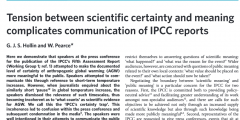Posts by Warren Pearce
Reviewing the evidence on transparency in science: a response to Lewandowsky & Bishop.
March 30, 2016
Co-authors: Warren Pearce, Sarah Hartley & Brigitte Nerlich. In January, Nature published a Comment piece by Lewandowsky and Bishop entitled “Don’t let transparency damage science“. The authors argued that some of the “measures that can improve science — shared data, post-publication peer review and public engagement on social media — can be turned against scientists”. …
Methodological clarity required when publishing social science in natural science journals
October 23, 2015
This is a joint post with Greg Hollin. The latest issue of Nature Climate Change features a Correspondence from Peter Jacobs and colleagues which concerns a recent Letter that appeared in the same journal; our Reply is also published. We do not wish to deny that there are real and significant differences between ourselves and …
The crucial role of culture in climate change
September 5, 2015
On Wednesday, I attended the US Ambassador’s ‘digital dialogue’ event on climate change at Winfield House, where policy wonks, journalists, NGO representatives and academics discussed their current hopes and frustrations. Beyond the usual grumbles about ‘bogus arguments’ against climate action, it was pleasing that some attendees outside of the social sciences chose to highlight the key role of cultural …
Who is responsible for GM moths?
July 23, 2015
This is a joint post with Sarah Hartley, Making Science Public Research Fellow What is the role of the public in science? Should public concerns about scientific innovation be taken into account when regulating new technologies? Are some types of concerns more valid than others? These are fundamental questions about the governance of innovation, and the answers …
Improving climate change communications: moving beyond scientific certainty
June 8, 2015
This is a co-authored post with Gregory Hollin. It is based upon our new paper in Nature Climate Change, which is the first piece of original research from science and technology studies (STS) published in the journal. In the last 25 years scientists have become increasingly certain that humans are responsible for changes to the …
Call for papers: Democratising science and technology policy in times of austerity
April 21, 2015
Myself and Sarah Hartley are convening a panel entitled ‘Democratising science and technology policy in times of austerity’ at the Policy and Politics conference in Bristol on September 15-16th. We invite abstracts (300 words) before the deadline of May 1st, with a particular interest in papers which straddle the boundary between STS and public policy. Go …
RRI at Nottingham: report from public lecture and workshop, January 2015
March 25, 2015
Joint post with Sarah Hartley and Eleanor Hadley Kershaw. On January 8th, Prof. Richard Owen delivered the MSP lecture “Responsible Research and Innovation (RRI): from nice words to meaningful action”, providing an engaging overview of the topic for over 60 attendees from across the University. Richard drew on classic literature from STS (for example, Collingridge’s …
Responsible Research and Innovation InfoHub
September 24, 2014
In parallel with the launch of the new report Responsible Research and Innovation: Responding to a New Research Agenda, this page acts as a focus and reference point for RRI activities across the University of Nottingham. The effective implementation of RRI into research programmes requires scientists and social science practitioners in RRI to be able to …
New report released on Responsible Research and Innovation
Today sees the launch of a new report on Responsible Research and Innovation (RRI). The report provides an overview of this emerging agenda, lays out approaches from key funders, and summarises RRI work already being carried out within University of Nottingham. The report also presents recommendations for the University’s future engagement with RRI, based on documentary analysis and …
Evidence-based policy: data has its limits
July 16, 2014
This post was originally published on the blog of the Alliance for Useful Evidence, an open–access network of more than 1,800 individuals that champions the use of evidence in social policy and practice. “Aaarghhh! Politics and policy-making is so frustrating! We spend so much time conducting careful scientific analysis in all kinds of fields of enquiry. The results are published …



